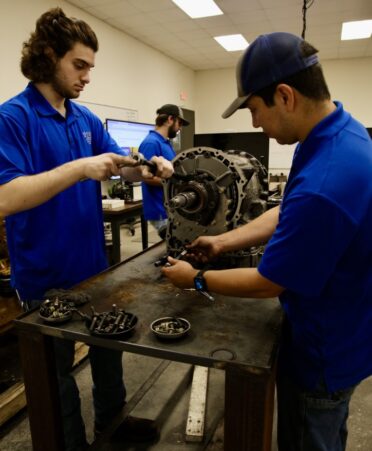(MARSHALL, Texas) – As a child, Damon Barker was fascinated by engines and Texas’ seemingly endless truck population.
“I’ve always looked at the semis going down the road and wondered how they worked,” Barker said. “That’s what started it all for me.”
Today, Barker is studying for a certificate of completion in Texas State Technical College’s Diesel Equipment Technology program at the Marshall campus, putting his passion for engines to work.
One could be mistaken and assume that the Marshall campus’ Diesel Equipment Technology program, which offers an Associate of Applied Science degree and two certificates of completion, only teaches students how to repair semitrucks. In reality, the program in Marshall focuses on off-highway technology. Students are taught about putting together and repairing the parts of heavy equipment such as earthmovers, mining machinery and, yes, semitrucks.
The certificate of completion program consists of 16 technical classes. Students are first taught the basics of safety and preventive maintenance before moving on to specific categories like powertrains and hydrostatic transmissions.
Lead instructor and 1993 TSTC graduate Bradley Hayes gained 25 years of experience in the diesel field before returning to teach at TSTC. Currently in his third year of teaching, he takes great pride in all that TSTC and his program have to offer.
“We have the most hands-on training of any technical-vocational school in the state,” Hayes said. “Our students tend to be visual and kinetic learners, so putting their hands on things, taking them apart, and understanding how they work goes a long way in their understanding of the material.”
TSTC students like Jakob Westbrook are a perfect example of Hayes’ statement.
“I was looking for a field to go into that involved working with my hands, and diesel technology has a lot of good growth to it,” Westbrook said.
He plans to complete both the Diesel Equipment Technology and Cybersecurity programs before aiming his sights on the natural gas industry.
Hayes plans to add a new class to the program that will debut in the summer 2024 semester: an advanced electrical class on hybrid and electric vehicle equipment.
“Hybrid and EV systems start at around 240 volts and go up as high as 900 volts, which is very different from most automotive standards, and it’s enough to be deadly,” he said. “We want to make sure people know what not to touch.”
For students needing financial help to complete their studies, Hayes personally recommends the mikeroweWORKS Foundation, an organization founded by the host of “Dirty Jobs” with $1 million in scholarship funds available to technical students.
TSTC offers students a variety of scholarship opportunities. To learn more about scholarships at TSTC, visit tstc.edu/scholarships.
According to onetonline.org, farm equipment mechanics and service technicians make an average of $46,580 per year in Texas, where the number of jobs was projected to increase 24% between 2020 and 2030.
“Our training allows (students) to shorten their learning curve,” Hayes said. “Once they get on the job, their learning and hands-on (experience) is at a very accelerated rate, and they generally rise to a mid-level position in their career path within just a few years.”
Hayes hopes to change the public’s perception that diesel technology is far more than just “old-school greasy mechanics.”
“Sometimes they think it’s low-skill jobs, and that’s not really where it is today,” Hayes said. “Diesel equipment develops the world. It’s not really something we can live without.”
For more information about TSTC, visit tstc.edu.
